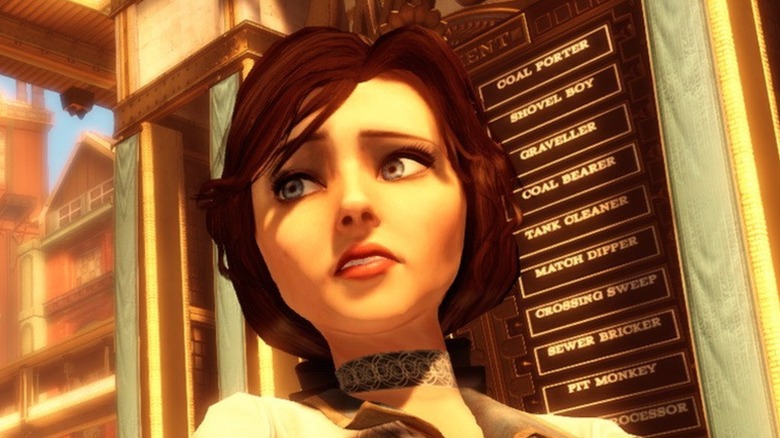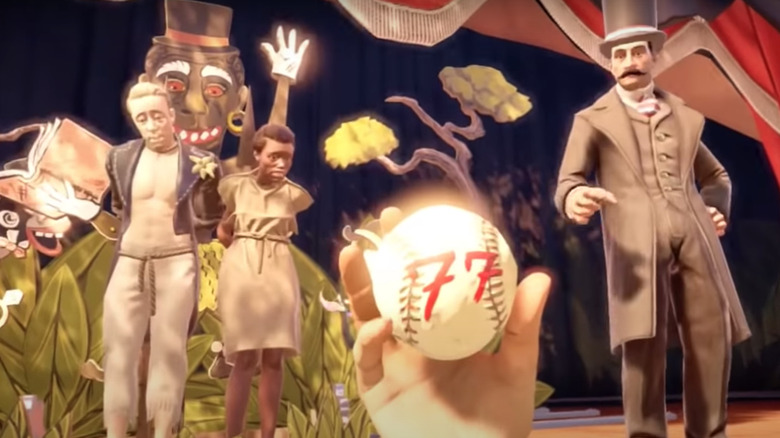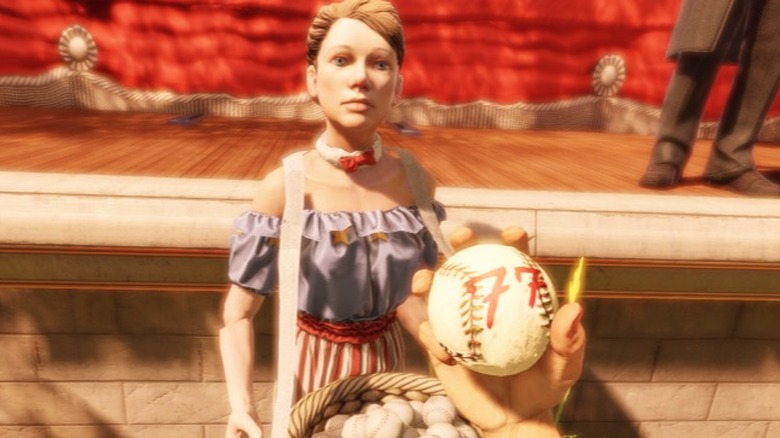The Bioshock Infinite Scene That Aged Poorly
Like many other entertainment mediums, video games have reached a point where some of the older titles contain scenes and ideas that did not age well. Sometimes, it's something that is straight up in bad taste, and sometimes it's something that was well-intended but misfires in one way or another. "BioShock" as a series deals with political and economic systems, showing the disaster that could happen if these ideas are taken to their extreme. The first two "BioShock" games focus on the most extreme version of libertarianism, while "BioShock Infinite" is an extreme version of a theocracy. All three of these games are reflection of series creator Ken Levine's belief that a utopian society is ultimately impossible, no matter how hard humanity may try. At the end of the day, as Levine told TechCrunch, "[T]hat's the problem with utopias — we bring ourselves to it, you know? We think we're leaving our problems behind but – I don't mean this in a cynical way – we are the problem."
While a fourth "BioShock" game is confirmed to be in development, we don't know yet the form of society or government it will tackle. Whatever route the next game in the series takes, there's hope that it will tackle societal ills with a bit more finesse than a certain section of "BioShock Infinite."
In "BioShock Infinite," the cloud city of Columbia is a religious society, one that was formed as a result of an alternate universe version of the US Civil War. Things turned out a lot differently in this version of history, and because of this, Columbia is largely an inherently racist society. This isn't immediately obvious to the player, but it is not long before a horrific demonstration makes the ugly side of this seeming utopia very obvious. However, due to some unfortunate decisions, this scene has aged poorly.
Bioshock Infinite lets players make poor decisions
Early in the game, as Booker Dewitt is exploring Columbia and learning about the cloud city, he comes upon a raffle in front of a stage and takes a number, written on a baseball. It is revealed that the winner of the raffle gets to throw the baseball at an interracial couple, who is surrounded by racist imagery. While the scene can certainly be uncomfortable, up to this point it serves its purpose well. It shows the ugly side of Columbia in a single scene and it demonstrates that some people who live there don't necessarily agree with these ideals, like this unlucky couple. What happens next is where things get even more problematic.
Players are presented with three options. To either throw the ball at the raffle announcer, throw it at the couple, or do nothing. Ultimately, all three options lead to the police noticing the "mark of the beast" on Booker's hand, preventing him from throwing the ball at anyone. The game, however, never reflects upon or discusses the player's choice. Instead, there is a situation where the "hero" of the story could have chosen to participate in a racist, hateful act, without any real consequences or conversation about it. There might be an argument that foreshadows a reveal at the end of "Bioshock Infinite," but it seems more likely that this resulted from a need to have a choice in the narrative-driven game. Needless to say, it hasn't sat too well with some players of the game.
BioShock Infinite players are still debating this scene
In discussions of the scene on Reddit, players have ruminated on their choices during the infamous raffle scene, and the results have proven interesting for "BioShock" fans. A number of gamers have revealed that they didn't realize they had a choice to simply not throw the ball, even after multiple playthroughs. Others have argued that anyone who throws the ball at the couple must have a mean streak to to them. Some have changed their tactics on subsequent playthroughs, but the end result is much the same. Some gamers have played through the scene and are uncertain whether or not their choice made an impact on the game at all, which would seem to indicate that the upsetting sequences doesn't quite hold the weight that the developers intended.
Ultimately, this might still be the scene from "BioShock Infinite" that causes the most debate. Whether its over the uncomfortable moral and societal implications of the scene, or simply the fact that the game doesn't quite present you with a choice that fully matters, fans will likely continue to talk about the raffle sequence for quite some time. Maybe "BioShock 4" will bring similar questions of right and wrong to bear in its narrative — if and when it finally happens.



